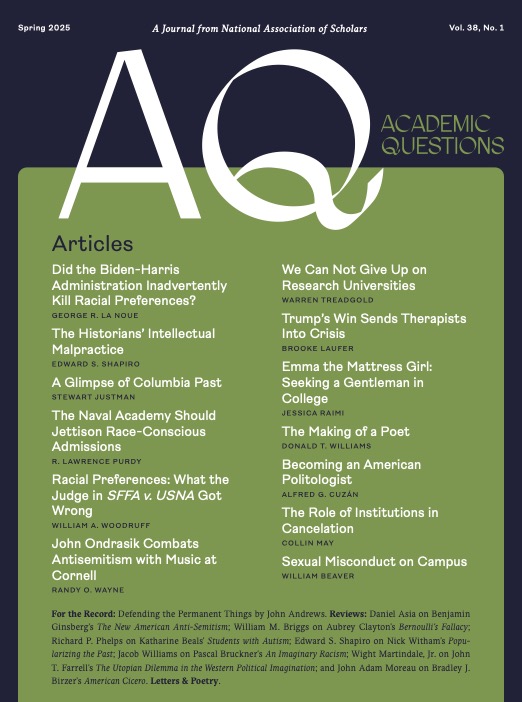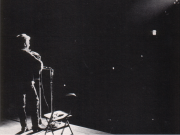An Imaginary Racism: Islamophobia and Guilt, Pascal Bruckner, Polity, 2022, pp. 224, $15.00 paperback.
Progressive taboos continually cut off debate about truth, forcing us to waste energy discussing whether it is bigoted to say controversial things. Among the many thinkers exploding this toxic obsession with causing offense is the French political philosopher Pascal Bruckner. Bruckner’s skillful deconstruction of the discourse of “Islamophobia” unintentionally advertises the superior capacity of the Anglo-American tradition to France’s secular republicanism in responding to the complex crisis triggered by the recent growth of the West’s Muslim population.
An Imaginary Racism is philosophically informed but primarily a work of political commentary, most of its nineteen chapters consisting of edited articles of Bruckner’s that appeared in French newspapers and periodicals over the last two decades. Bruckner’s analysis of the Islamophobia taboo will prove congenial to English-speaking conservatives, especially those versed in the recent work on “woke” ideology. A longstanding critic of Western “self-hatred” (58), Bruckner believes that the Western left’s alliance with Muslims is driven by contempt for their own inheritance. If Islam is the ultimate alterity, what better way to “beat bourgeois society” (43) than to ally with the Oriental Other?
In Bruckner’s telling, the left’s discourse on Islam effects a “transubstantiation” (27) which turns Islam from a belief system, which might be true or false, or a civilization, which might be base or noble, and instead figures Muslims as sacrificial victims, in contrition for whose perpetual oppression the West must find atonement for its past and present sins.
The Islamophobia taboo, Bruckner argues, also obscures and inverts real power dynamics by presenting Islamic orthodoxy as implicitly “untouchable” (72), thus winking at the “internal policing of reformist or liberal Muslims” (21). Thus, while Christians are persecuted in many Muslim countries, the left harps on the comparatively mild discrimination endured by Western Muslims (78), showing that its selection of victims is driven not by compassion for global suffering but the desire to disrupt traditions at home. This distortion of power dynamics is also blamed by Bruckner for attempts by anti-Islamophobia campaigns to appropriate the moral horror of the Holocaust, portraying the Muslim as the “real Jew” (90) even as anti-Semitic attitudes are sadly common among many Muslims.
Much of the foregoing analysis is convincing. Careful readers will take issue with some of Bruckner’s many generalizations, but this does not detract from the overall indictment of the bankruptcy of large swathes of the pro-Islam left. Bruckner does not ignore the pluralism and intellectual diversity of Islam. Nevertheless, it is still worth recalling—since Bruckner never mentions the fact explicitly—that despite all the widespread Muslim convictions that Westerners might find problematic, the number of people with favorable views of extreme groups like ISIS is very small in nearly all Muslim-majority countries.1
It is Bruckner’s normative arguments that become more problematic. As a representative of the nouveaux philosophes, Bruckner’s premises are similar to those of the early American neoconservatives. Like Irving Kristol, Daniel Bell, or Daniel Patrick Moynihan, Bruckner’s instinct is to defend the West’s current political and ideological regime. Bruckner is liberal insofar as a vital part of this regime is a commitment to “individual rights,” conservative insofar as the regime’s stability also requires a “civilizing base” that rejects “facile hedonism” (55) and the “naïve cult of the present moment” (147).
Unlike the early neoconservatives, however, Bruckner does not have much sympathy for traditional religion of any stripe. It is, apparently, “worrisome” to see Trump praised by “the most narrow-minded evangelical churches,” while “creationist ideas” (held by more than a third of Americans!)2 are “no less grotesque” than Islamic fundamentalism (89). Can we take this claim seriously? Plus ça change, perhaps, for French secularism.
The problem here is that Bruckner’s deepest commitments are not just to “Western values” in general but to a very specific republicain conception of the “Western way of life” (154). The slide from “values” to “way of life” is telling. Since it is far from clear whether churchgoing Texans share a substantial “way of life” with woke coastal elites, the Anglo-American tradition has typically interpreted the “values” all must share as limited to the political domain, excluding questions of personal lifestyle. Bruckner, however, is leery of such pluralism.
Obviously, no society can tolerate every cultural practice; in the limiting case, a libertarian society must at least restrict cultures that practice direct physical violence against non-consenting persons. Bruckner would go much further, as illustrated by a slightly unappealing passage discussing women’s headwear. Here, Obama is sternly criticized for the supposed hypocrisy of defending women’s right to wear the hijab despite the fact that his own wife declined to wear one when visiting Saudi Arabia. Perhaps, to advocate briefly on behalf of the Devil, Obama just thought it should be a personal choice? But Bruckner argues that “once accepted, the veil … threatens to become the norm for all” (120). Since there is virtually no chance of hijab becoming legally compulsory in America or France, what Bruckner must mean is that veiling threatens to become a norm backed by social pressure but not physical force.
This raises a vital question: at what point can social pressure—the fear of other people’s non-violent but disapproving words or deeds—become such a constraint on freedom that the state must violently (for all state action is backed by threatened violence) intervene to disrupt it?
Any answer we apply in the case of veiling will have implications elsewhere. If the state must, à la Rousseau, “force” a young Muslim woman to be “free” from her mother’s verbal pressure to cover her hair, why should it not take the same dim view of Christian or Jewish parents who wish their child to dress in accordance with their biological sex rather than a newly-adopted dysphoric “gender identity”? Both cases involve a trade-off between state coercion and social pressure.
Wherever the line is drawn, it must be drawn consistently and drawing it where Bruckner appears to want could have awful consequences for basic religious liberties. Unsurprisingly, Bruckner takes an incredibly dim view of what Americans call religious accommodation—but which he prefers to call “secession” (140). Not just hijab but “places for prayer in businesses” and even the option of “halal food in prisons and schools” all constitute a betrayal of la République.
Bruckner’s impractical conclusions also highlight the virtues of the American tradition. Reflecting on the Catholic Church’s voluntary abandonment of its anti-liberal politics at Vatican II, Bruckner calls for “a foundation, a charter, or even a concordat” to “transform Muslims in France into French Muslims” (148). This will apparently achieve two ends. It will open an intellectual space for reinterpretation of the Qur’an, much needed because its status for Muslims as the uncreated speech of God means that “commentary is forbidden” (142). It will also ensure that “citizenship and belonging to the nation take priority over religious convictions” (148).
The argument here is insufficiently nuanced. It is not strictly true that “commentary” on the Qur’an is forbidden by orthodox Islam. Rather, it exists but is constrained by scholarly conventions that are cautious about departures from the positions of pre-modern interpretive authorities. There are “literalist” (Salafi) views that bypass this interpretive tradition, but the conservative ethical and political positions with which Bruckner takes issue are often affirmed by mainstream Islamic “traditionalism,” not just Salafist literalism. We must ask, then, what kind of “new criticism and hermeneutics” (159) Bruckner has in mind? Should Muslims deploy the latest tools of post-structuralist analysis to reduce the Qur’an to a purely historical text like any other (in which case, why should they bother being Muslim at all)? Perhaps, as 300 prominent French intellectuals have proposed, offensive verses should simply be expunged from the Qur’anic manuscripts?3
Such radical solutions are unlikely to be accepted. They are also completely unnecessary. Since we should not play into the hands of the woke left by forcing everyone to affirm the same views of gender or personal morality, the legitimate challenge concerns Muslim attitudes to the basic principles of free political regimes. Can Muslims sincerely accept a constitutional order that respects religious freedom for all but presupposes the truth of no specific faith tradition?
If the answer is to be “yes,” it will need to come from a reform process that is grounded in tradition, not imposed by politicians. Most Muslims take the truth-claims of their religion seriously (why shouldn’t they?) and the center of intellectual gravity in Islam lies with the traditionally-credentialled scholars. These scholars are committed to what the Muslim academic Timothy Winter calls an orthodox “root epistemology”4: the methods of the traditional exegetes are to be upheld; but one is not always inflexibly bound to reproduce the specific conclusions of premodern scholarly authorities. Caution is affirmed, but, in the right conditions, reform can still take place. Thus, we find the extremely traditional Mauritanian scholar Abdullah Bin Bayyah calling for the full and equal citizenship of the Muslim world’s religious minorities and rejecting their often-humiliating historic dhimmi status—not because it conflicts with some Jacobin conception of freedom, but because, in Bin Bayyah’s reformist traditionalism, upholding this status negates the more authoritative precedent of Muhammad’s relatively egalitarian governance of Medina.5
This combination of fidelity and flexibility is illustrated by what analysts call the neotraditionalist movement in Islam, in which important traditional scholars are thinking through the problems of modernity in a more flexible fashion.6 It may come as a shock to certain French intellectuals, but not to open-minded conservative thinkers like Robert P. George,7 that this rethinking has drawn deeply on the Anglo-American conservative tradition. Some of the finest Muslim minds are reconciling Islam and modernity—but they are doing so by drawing on the insights of Roger Scruton and Allan Bloom, not Deleuze and Derrida.
Bruckner’s analogy to Vatican II is helpful—but not in the way he intends. As George and others have argued, it was in part the American experience of religious liberty that gradually changed the mind of the Church about liberal constitutionalism.8 When the French revolutionaries plundered Church property and imposed a loyalty oath on clergy, the result was a century and a half of instability and chaos. The genius of America was in recognizing that political belonging does not have to take priority over religious conscience—after all, for Christians, true citizenship is in Heaven—except, of course, where accommodations to conscience would undermine the constitutional order or threaten violence.
Bruckner not only seems unwilling to countenance this, but also even to imagine Muslims embracing a liberal constitutional order while retaining distinct and conservative social values (hence, perhaps, his contempt for Evangelicals). This is a terrible blind spot and indictment of the laïque approach, which appears indistinguishable from the position of radical LGBT activists.
Serious adherents of the Abrahamic faiths believe that religious obligations are of more eternal significance than the demands of the Earthly city. Those of us who embrace liberal constitutionalism also recognize that those demands must be apportioned on terms that are fair and just to fellow citizens of different religious convictions. Today, unfortunately, some Muslims believe that their religious obligations demand rejecting the project of pursuing fair terms (except as a temporary and pragmatic compromise). Many Catholics also believed this before Vatican II. Today, some Catholics are returning to this position of refusal, as woke intolerance of traditional social teaching drives the Church’s youth into the arms of the new “integralism.”
Where nations honor conscience, grant reasonable accommodations, and respect religious liberty, faith traditions often work their way to accepting the self-restraint that pluralism requires. Muslim scholars like Mohammad Fadel are beginning to work out what an Islamic equivalent to dignitatis humanae might look like. The end result of their project cannot be predicted with certainty.
I am confident, however, that this project will fail if it is pursued on the unilateral terms of a bloated and imperious government with the whiff of grapeshot ever hovering in the air. When Bruckner says the “Old World” could be the “seat” of the new hermeneutics (159), we must apply more geographical finesse. It is the English-speaking world, old and new, in which hope for a rapprochement between Islam and the West lies. Whether this hope will be fulfilled remains an open question: but it is a question best addressed in the spirit of intellectual freedom, and not under the paternal supervision of a state that (as Americans know) has no business making windows into its citizens’ souls.
Jacob Williams is an Oxford Ph.D. candidate in political theory, where he is researching the postliberal movement and its critique of the liberal regime. He has published academic work on religion, conservatism, and Western culture, and his commentary has appeared in First Things, The Imaginative Conservative, The Critic, and elsewhere. He is also the Head of Domestic Policy at Pickthall House, a UK think tank addressing problems of cultural diversity. Williams appeared in AQ in winter 2024 with “The Rise of ‘Woke’: Is Kaufmann’s Account the Best?,” a review of Eric Kaufmann’s The Third Awokening (2024).
1 Jacob Poushter, “In Nations with Significant Muslim Populations, Much Disdain for ISIS,” Pew Research Center, November 17, 2015.
2 Megan Brenan, “Majority Still Credits God for Humankind, but Not Creationism,” Gallup, July 22, 2024.
3 Karina Piser, “Muslims Recoil at a French Proposal to Change the Quran,” Atlantic, May 3, 2018.
4 Abdal Hakim Murad, Travelling Home: Essays on Islam in Europe, (The Quilliam Press, 2020): 9.
5 The Marrakesh Declaration,” Anti-Defamation League, February 10, 2016. https://www.adl.org/resources/blog/marrakesh-declaration.
6 Jacob Williams, “Islamic Traditionalists: ‘Against the Modern World’?” Muslim World 113, no. 3 (2023): 333–54.
7 Robert P. George, “Muslims, Our Natural Allies,” First Things, February 2, 2014.
8 Robert P. George, William L. Saunders Jr., “Dignitatis Humanae: The Freedom of the Church and the Responsibility of the State,” In Catholicism and Religious Freedom: Contemporary Reflections on Vatican II’s Declaration on Religious Liberty, ed. Kenneth L. Grasso, Robert P. Hunt (Lanham, MD: Rowman & Littlefield).
Photo by Artin Bakhan on Unsplash














